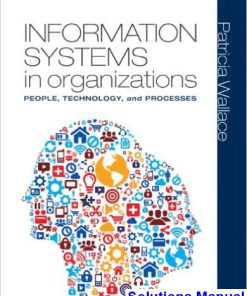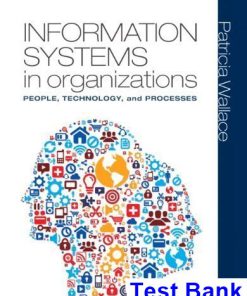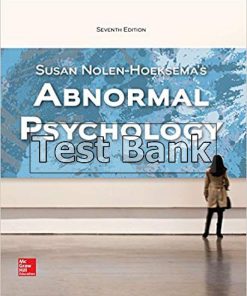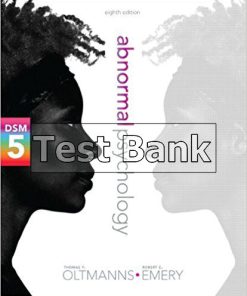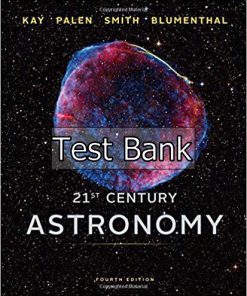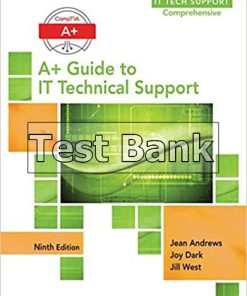Leadership and Management in Police Organizations 1st Edition Giblin Test Bank
$26.50$50.00 (-47%)
Leadership and Management in Police Organizations 1st Edition Giblin Test Bank.
You may also like
-
$26.50
$50.00
This is completed downloadable of Leadership and Management in Police Organizations 1st Edition Giblin Test Bank
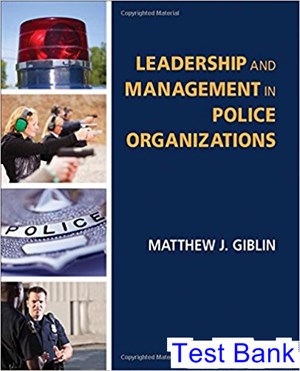
Product Details:
- ISBN-10 : 1483353176
- ISBN-13 : 978-1483353173
- Author: Matthew J. Giblin
Built on a foundation of nearly 1,200 references, Leadership and Management in Police Organizations is a highly readable text that shows how organizational theory and behavior can be applied to improve the operations, leadership, and management of law enforcement. Author Matthew J. Giblin emphasizes leadership and management as separate skills in successful police supervisors and executives, illustrating to students how the two skills combine to improve individual and organizational efficacy in policing. Readers will come away with a stronger understanding of why organizational decisions matter and the impact research can have on police departments.
Table of Content:
- Chapter 1. Introduction to Police Organizations
- Overview
- Organizational Theory
- Organizational Behavior
- Defining Organization
- Recognizing Variation
- Conceptual Similarities
- Your Turn . . .
- Key Terms
- Discussion Questions
- Web Resources
- Chapter 2. Police Organizational Structure
- Introducing Police Organizational Structure
- Organizational Complexity
- Vertical Complexity
- Horizontal Complexity
- Spatial Complexity
- Organizational Control
- Direct Supervision
- Formalization
- Policing Insights on . . . Accreditation (Lori Mizell)
- Centralization
- Your Turn . . .
- Key Terms
- Discussion Questions
- Web Resources
- Chapter 3. Organizational Theory and Police Organizations
- Introducing Organizational Theory and Police Organizations
- Classical Theory
- Scientific Management
- Bureaucracy
- Administrative Theory
- Policing Insights on . . . The Hierarchy of Authority (Nate Thompson)
- Classical Theory and Police Organizations
- Human Relations Theory
- The Hawthorne Studies
- Human Relations Theory and Police Organizations
- Open Systems Theory
- Contingency Theory
- Resource Dependence Theory
- Institutional Theory
- Your Turn . . .
- Key Terms
- Discussion Questions
- Web Resources
- Chapter 4. Recruitment, Training, and Retention
- Introducing Recruitment, Training, and Retention
- Recruitment
- Fulfilling Staffing Needs
- Law Enforcement Recruiting
- Recruitment Methods
- Conveying Expectations
- Diversifying Police Agencies
- Policing Insights on . . . Recruitment (David White)
- Screening and Selection
- Training
- Training Overview
- Police Academy
- Field Training
- Turnover and Retention
- Your Turn . . .
- Key Terms
- Discussion Questions
- Web Resources
- Chapter 5. Motivation and Job Design
- Introducing Motivation and Job Design
- Overview of Motivation
- Policing Insights on . . . Motivation (Paul Echols)
- Content Theories
- Maslow’s Hierarchy of Needs
- Motivator-Hygiene Theory
- McClelland’s Theory of Learned Needs
- Process Theories
- Equity Theory
- Organizational Justice
- Expectancy Theory
- Job Design
- Your Turn . . .
- Key Terms
- Discussion Questions
- Web Resources
- Chapter 6. Leadership
- Introducing Leadership
- Defining Leadership
- Leadership and Rank
- Leadership Versus Management
- Leadership Theories
- Trait Theories
- Policing Insights on . . . Leadership (Valerie G. Womack)
- Behavioral Theories
- Contingency and Situational Theories
- Transformational-Transactional Leadership
- Leadership Development
- Your Turn . . .
- Key Terms
- Discussion Questions
- Web Resources
- Chapter 7. Power and Compliance
- Introducing Power and Compliance
- Defining Power
- Power and Related Constructs
- Power and Authority
- Power and Influence
- Power and Leadership
- Bases of Power
- Reward Power
- Coercive Power
- Legitimate Power
- Referent Power
- Expert Power
- Information Power
- The Effectiveness of Power
- Lack of Surveillance
- Technology and Power
- Policing Insights on . . . Video Recording Technology (Michael Kyle)
- The Limits of Position Power, Rewards, and Punishments
- Your Turn . . .
- Key Terms
- Discussion Questions
- Web Resources
- Chapter 8. Stress and Burnout
- Introducing Stress and Burnout
- Defining Stress and Burnout
- Occupational Stress
- Burnout
- Major Stressors in Policing
- Task-Related Factors
- Policing Insights on . . . Stress (Saly J. Fayez)
- Organizational Factors
- Work Relationships
- Career Issues
- Work–Home Conflict
- Individual and Organizational Consequences
- Coping With Stress and Burnout
- Addressing Stress and Burnout
- Your Turn . . .
- Key Terms
- Discussion Questions
- Web Resources
- Chapter 9. Organizational Implications of Police Innovation
- Introducing Police Innovation
- Questioning Standard Model Strategies
- Modern Policing Innovations
- Focused Deterrence Partnerships (Collaboration)
- Compstat (Accountability and Decentralization)
- Evidence-Based Policing (Research Use)
- Predictive Policing (Analytics)
- Overcoming Resistance
- Policing Insights on . . . Reform (Richard W. Myers)
- Your Turn . . .
- Key Terms
- Discussion Questions
- Web Resources
- Chapter 10. Measuring Individual Performance
- Introducing Individual Performance
- Purpose of Individual Performance Measurement
- Performance Measures
- Policing Insights on . . . Fitness Standards (Eric Gumina)
- Traits
- Outputs
- Outcomes
- Sources of Appraisal Information
- Supervisors
- Self-Appraisal
- Peers
- Subordinates/Clients
- Training for Performance Appraisals
- Frequency of Performance Appraisals
- Satisfaction With Performance Appraisals
- Your Turn . . .
- Key Terms
- Discussion Questions
- Web Resources
- Appendix
- Chapter 11. Organizational Accidents and Disbanding
- Introducing Organizational Accidents and Disbanding
- Defining Organizational Accidents
- Police Vehicle Pursuit Accidents
- Wrongful Arrests and Convictions
- Police Training Accidents
- Explaining Organizational Accidents
- Administrative Breakdown
- Normal Accidents
- Structural Secrecy
- Knowledge Conflict
- Preventing and Mitigating Organizational Accidents
- Resilience
- Reliability
- Policing Insights on . . . Training to Avoid Accidents (Michael Schlosser)
- Organizational Termination
- The Endurance and Death of Police Organizations
- Replacement of Police Services
- Your Turn . . .
- Key Terms
- Discussion Questions
- Web Resources
- Chapter 12. Contemporary Issues in Police Organizations
- Introducing Contemporary Issues in Police Organizations
- Police–Public Confrontations and a Legitimacy Crisis
- Policing Insights on . . . The Future of Police Organizations (Daniel Isom)
- Improving Police–Community Relations
- Procedural Justice
- Training in Procedural Justice
- Recognizing Implicit Biases
- Investigating the Police
- Fostering Independence
- Federal Intervention
- Cameras, Transparency, and Behavior
- De-Policing and the Ferguson Effect
- Your Turn . . .
- Key Terms
- Discussion Questions
- Web Resources
- Glossary
- Notes
- Index
- About the Author
People Also Search:
leadership and management in police organizations
leadership and management in police organizations 1st edition giblin
leadership and management in police organizations 1st edition download scribd
leadership and management in police organizations 1st edition
leadership and management in police organizations 1st edition testbank download pdf

